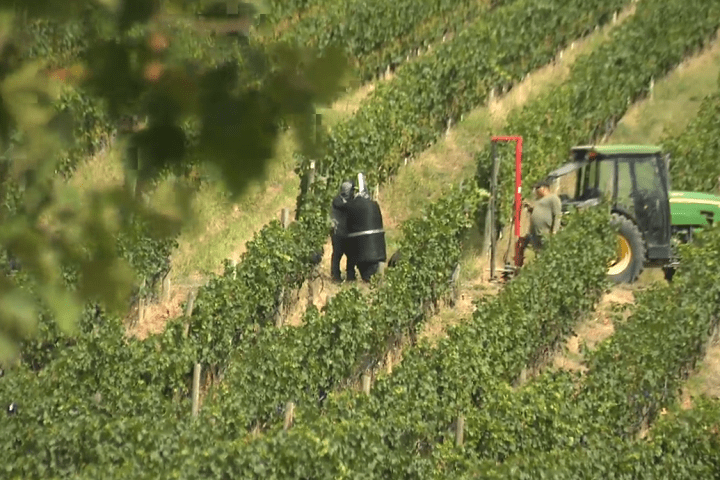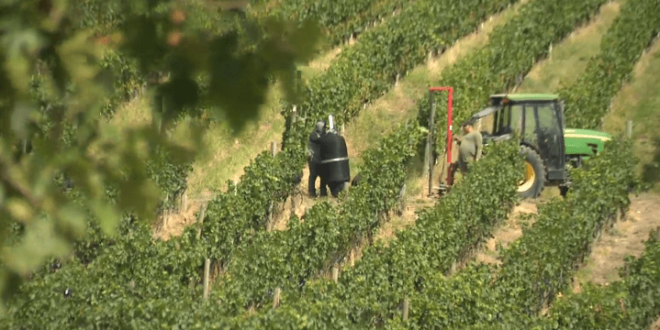
Businesses that rely on visitors in Kelowna are feeling the effects of ongoing wildfires and the travel restrictions imposed on the region over the weekend.
Visitors and tourists quickly disappeared as the province pleaded with people to leave the Central Okanagan to make room for evacuees and emergency crews who were in desperate need of accommodations.
“We think they will come back next year (but) we are thinking it will really affect our business (this summer),” said Gurpreet Kaur with Kelowna’s Pita Pit.
Pita Pit in downtown Kelowna and Quails’ Gate Estate Winery both told Global News they are extremely reliant on tourism, especially in the peak summer month of August.
“Tourism is a big part of what we do here — it is critical for us,” Quail’s Gate vice-president of marketing and sales Angela Lyons said. “It was a bit … disruptive. At first, (our primary concern) was we wanted to ensure the safety of all of our employees. Then we started to look at ways to support our community.”
Despite the sudden drop in sales, both businesses are supplying food for firefighters, emergency support staff, and volunteers.
“We were giving free food to the community to those who have been affected … RCMP, firefighters, ambulance and volunteers,“ Kaur said.
“On the weekend, because we closed our restaurant, we have a full culinary team here and we have lots of food, so we quickly mobilized and we are providing more than 600 meals a day to firefighters and local emergency support services,” Lyons said.
Lisanne Ballantyne, CEO and president of Tourism Kelowna, said she expected the restrictions because of how serious the wildfire situation was. She acknowledged the travel restrictions were needed to protect the community and support the provincial government’s decision.
“All of these restrictions impact our tourism industry, which is a $2.1 billion industry in our region, in a significant way. August is typically one of our busiest months for tourism in this area,” she said.
Ballantyne added local businesses were looking forward to the summer tourist season to regain business lost during the COVID-19 pandemic.
The Thompson Okanagan Tourism Association echoed Balantyne’s comments. President Ellen Walker-Matthews said many businesses will now struggle in the winter because of their summer tourist season being cut short.
“Definitely (the wildfires) have completely decimated the last part of our summer,” Walker-Matthews said. “These are three important weeks that really carry our businesses through the winter.”
As of Wednesday, travel restrictions to the Southern Interior, with the exception of West Kelowna, have been lifted.
But the the effects of the restrictions and the ongoing smoke and fires in the area have been significant.
Just this week, Sarah McLachlan cancelled two shows, and various fairs, festivals, weddings and an Iron Man Triathlon have been scrapped.
And while many hotels in the region have been booked by the province to house emergency workers and evacuees, the industry now says there is enough space to invite tourists back.
“We now know that we have enough rooms secured, there are hundreds and hundreds of rooms that have been held for people who are evacuated, so we know those people have access to safe shelter,” B.C. Hotel Association president and CEO Ingrid Jarrett said.
“Now is the time that we look at regions like Kamloops, the South Okanagan, Summerland, Penticton, Oliver, Osoyoos and Kelowna property as a city that the business has evacuated, and yet all the indicators are that the fire is becoming under control, and other than the air quality most of those regions have extraordinary tourism experiences that we need to market.”
Despite restrictions being lifted, the province is still urging people to steer clear of some communities that remain in crisis due to fire, including Lake Country and the North Shuswap.
“I know that many communities in the Interior are looking forward to welcoming, responsibly recreating tourists again. But I ask that the traveling public continue to be thoughtful about where they go,” Emergency Management and Climate Readiness Minister Bowinn Ma said.
The provincial government has promised it will support the industry, but details of what that support will look like remain unclear.
[ad_2]You can read more of the news on source
 Travelsmart
Travelsmart



